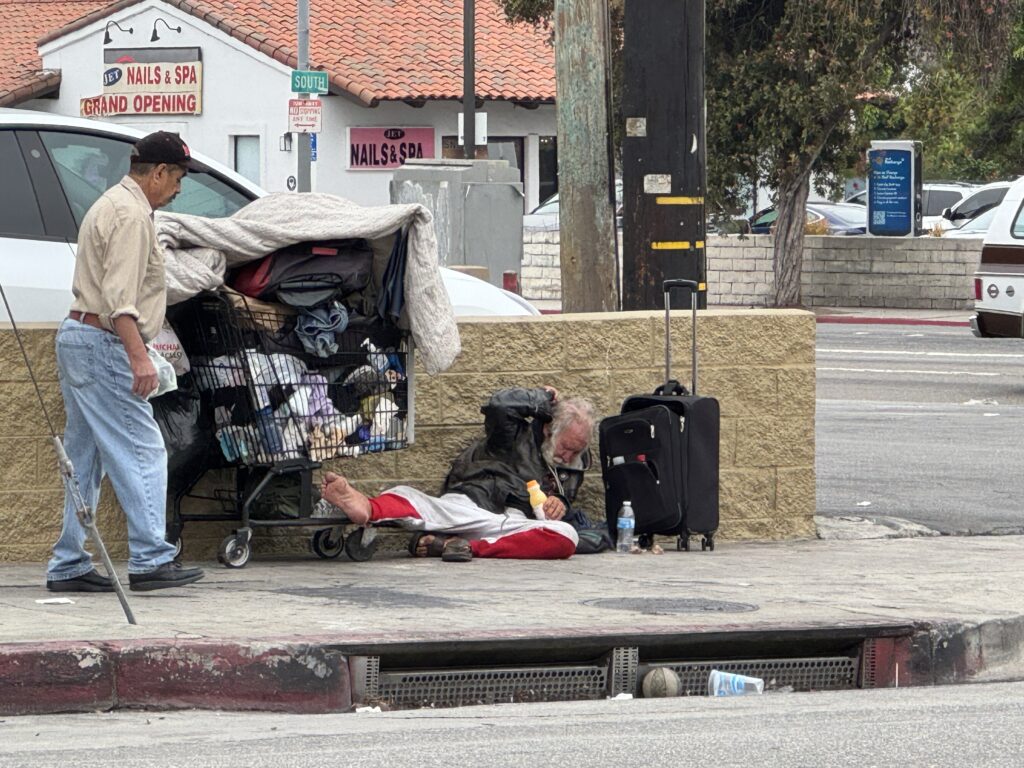(Editor’s Note: Tim Campbell is a Westchester resident who spent a career in the public service and managed a municipal performance audit program. He wrote: “I’ve written a bazillion words about homelessness, and this guy sums it up perfectly in one page!” And because what Tim writes is well-researched and well-thought out, I went to the story, which ran in the California Globe on August 12.)
Compassion without structure is chaos.
By EDWARD ESCOBAR
Walk through any major American city today—San Francisco, Oakland, Los Angeles, Portland, Seattle—and you’ll see the same troubling pattern: sidewalks turned into encampments, public parks overtaken by tents, and transit stations rendered unusable. This isn’t just a humanitarian crisis. It’s a public safety emergency, a sanitation nightmare, and a glaring indictment of failed policy.
Let’s be clear: no one is guaranteed a home simply by virtue of living in America. What we can and should offer is temporary, transitional shelter—a safe place to stabilize, not a permanent entitlement. But instead of enforcing this principle, our cities have allowed the streets to become de facto housing, with little oversight and even less accountability.
The Real Crisis: Oversight, Not Just Compassion
Many of those living on the streets face serious challenges—mental illness, substance abuse, trauma. These are not conditions that resolve themselves. The state has a custodial responsibility to intervene, not abandon. That means enforcing laws, offering treatment, and ensuring that public spaces remain safe and functional for everyone.
But instead of real solutions, we get performative compassion—billions funneled into nonprofit organizations that promise progress but deliver stagnation. These groups, often politically connected, operate with minimal transparency and maximum funding. Their executive directors earn six-figure salaries while the streets they claim to serve grow more dangerous and dysfunctional.
Cronyism Masquerading as Charity
Let’s call it what it is: grift disguised as goodwill. Elected officials funnel taxpayer dollars to nonprofits that support their campaigns, creating a feedback loop of exploitation. The suffering of the homeless becomes a business model, not a problem to solve. And when the public demands answers, these officials feign confusion—“We don’t know why it’s getting worse,” they say, as billions vanish into bureaucratic black holes.
This isn’t socialism. It’s not even capitalism. It’s cronyism, pure and simple. And it’s unacceptable.
A New Path Forward
We need policies that are firm, fair, and focused:
– Mandatory transitional shelter with clear timelines and pathways to treatment or employment.
– Enforcement of public space laws to protect safety and cleanliness.
– Audits and accountability for every dollar spent on homelessness programs.
– Mental health and addiction services that are compulsory for those who need them—not optional.
Compassion without structure is chaos. America must stop pretending that letting people suffer in tents is humane. It’s not. It’s abandonment.
Let’s reclaim our cities—not with cruelty, but with courage. Let’s demand results—not rhetoric. And let’s stop subsidizing failure.


Along these lines, who can help find shelter for the poor woman who occupies the bus bench in Washington Blvd at Pacific ave . I drive by all times of day and night and there she sits, seemingly healthy and alert with her suitcases. How does she eat, bathe, toilet? What can be done to help her find shelter? Any suggestions??
Keep up this impressive work.
Hopefully, enough people will get it.
Okay, CTN. Most of us are very well aware of the problems surrounding homelessness. And we even agree with a number of the solutions Maybe we are even aware that there exists a “homeless industrial complex” in LA and other cities. We may not realize how deep the corruption goes.
However, even though the majority of the Palisades voted D in the ’24 election, we have managed to build a very effective local homelessness response through the Task Force on Homelessness. That volunteer organization continues to be eyes on the streets and hillsides, and, working with an understaffed police and lack of other city services have been able since 2016 to engage with, care for and house over 200 of the very tough cases Tim Campbell’s article mentions. LA is infamous for its shameful homeless problem. But one reason people bring families and build schools in our town has been safety and great quality of life. That work takes expertise, but the glue is the volunteers. As we move back in, the Task Force needs volunteers. Thank you, CTN, for supporting us in the past. Please send returning and new families to http://www.Homelesspalisades.org to learn about this historically successful response to our local homelessness issue.
Reach out to Traci Park’s office, Carol Williams is the homeless coordinator for CD11 [email protected].
If the woman was in Pacific Palisades, I’d refer you to the Pacific Palisades Task Force on Homelessness, the social workers that have been hired work with people to help them find housing.
Excellent “New Path Forward” – as a displaced Palisades resident currently living in West L.A. near Wilshire and Barrington, I walk or drive by 7-Eleven each day to see homeless or drugged-out vagrants lying on the sidewalks around the store. They are typically begging for money, yelling in the air, or lying on the ground.
One additional suggestion would be to provide store owners with a 24/7 Hotline that they can call to dispatch support for this people to see that they get the assistance they need. Mandatory removal should be the standard protocol. Temporary housing is a secondary need.
The help shelters could be located at the shut down military bases that every state has
3 Phase
1- clothes, employment and a safe regroup
2- safe drug use
3- mental illness control an evaluation
Its worth a try